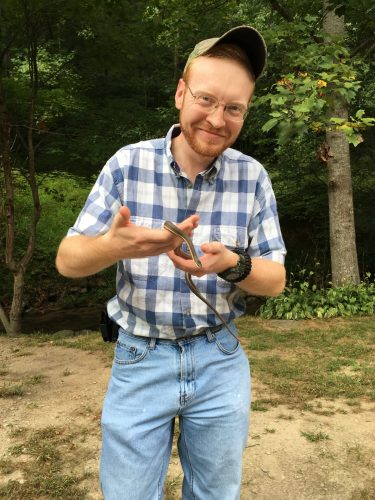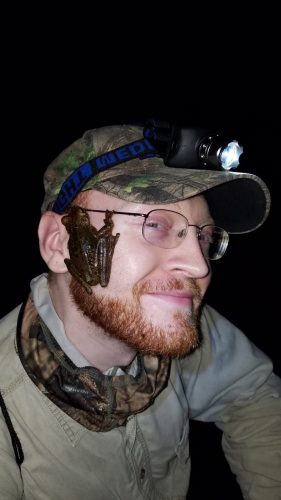
Tyler Bowling is the manager for the Florida Program for Shark research and a Ph.D. student in UF zoology program.
1. Where are you from?
I grew up in rural southern Maryland on a small farm.
2. Why did you want to be a scientist when you grew up?
I saw a Nat Geo special about coral reefs at age two, and I was fascinated. I could not go to the reefs yet, but I would explore the forest and track animals as a kid to learn everything I could about the natural world around me. I always knew since I was a child, I would be a scientist because I had to know how everything worked and why. Sharks fascinated me immediately. These animals are (as a lineage) old! Evolution has optimized these species in unique ways to be the greatest predators. We know very little about shark species still today. So, these beautiful animals have this air of mystery around them. There are so many questions we can ask, and the answers are different for every species, and finding answers is hard. The challenge is part of the fun.
3. How did you come to study sharks?
I knew I wanted to study sharks as a kid, so I wanted to build my resume early. I was fortunate enough to have parents that would support my goals at such a young age. As a family, we would be volunteers to assist with sea turtle nesting censuses up and down the East Coast. I became a volunteer educator at a local museum in high school. In college, I was able to be an undergraduate researcher studying sexual selection in tree frogs. And I did a lot of other fun things to boost my resume along the way, but it all was (direct or indirectly) to get me to my goal of studying sharks. Eventually, I was accepted into the program at UF to get my Ph.D. studying sharks. I was getting to finally see the fulfillment of my goals, but it got better. I was given the opportunity to run the shark program and various databases within as a graduate student. I love what I do and look forward to going to work every day.
4. What are the current projects you are working on?

As the shark program manager, I oversee many things. Including the International Sawfish Encounter Database, an army of volunteers, the outreach to the public, our online presence, and a dozen other things. But the majority of my time is spent running the International Shark Attack File (ISAF). The investigative process of trying to determine the circumstances involved in an attack and reaching out to people all over the world and learning new behaviors of sharks is incredible. Naturally, due to my involvement with ISAF, my thesis is heavily based around shark attacks. New Smyrna Beach is the “shark bite capital of the world.” They see more bites than anywhere else, and all within a very small geographic area (like smaller than a football field). That’s really weird! So why there? I am tagging blacktip sharks in the area and looking at the environmental factors, like temperature rain, etc. that bring the sharks close to shore. Not only can we use this knowledge to protect the surfers, but we can solve a cool natural world mystery!
5. Why should people care about your work?
The goal of the whole ISAF program is to learn about why/when/where/ how sharks bite people. Sometimes the shark is provoked by the person, or the shark makes a mistake. Sometimes we just don’t know what happened. But as we document more cases around the world, we learn what protective measures work for swimmers and how these animals typically behave.
6. What is your favorite shark or shark fact and why?
My favorite shark is constantly changing. There are about 400 species and counting. A common misconception is that a shark is a shark. Any shark news and the press just slap a picture of a great white on it. A dog and a kangaroo are about as related as a great white and a bull shark. So these animals are behaviorally and physically very diverse. I learn something new all the time about a species, and I have to tell everyone this awesome new factoid. So I don’t have A favorite, I just love sharks as a group.